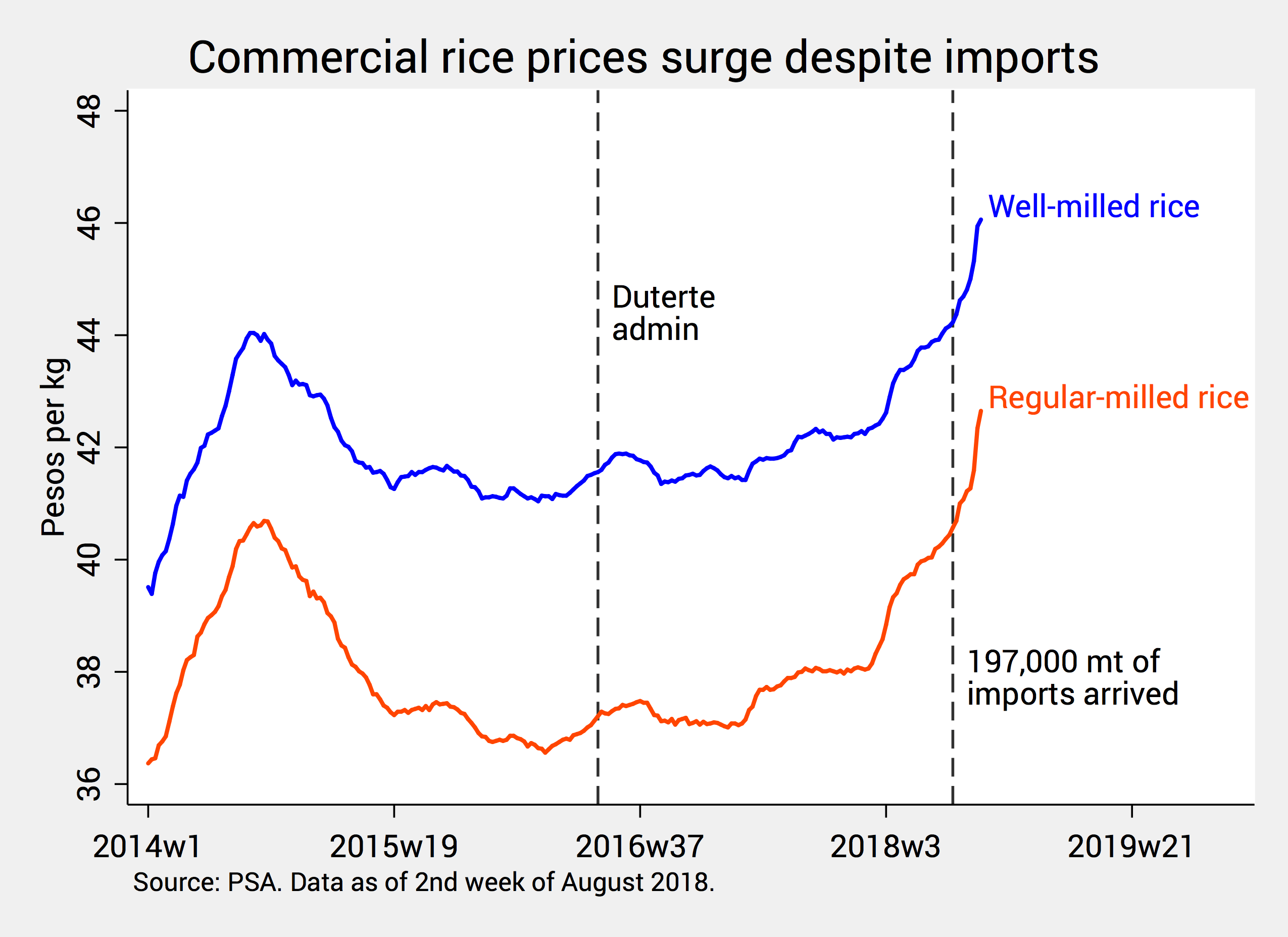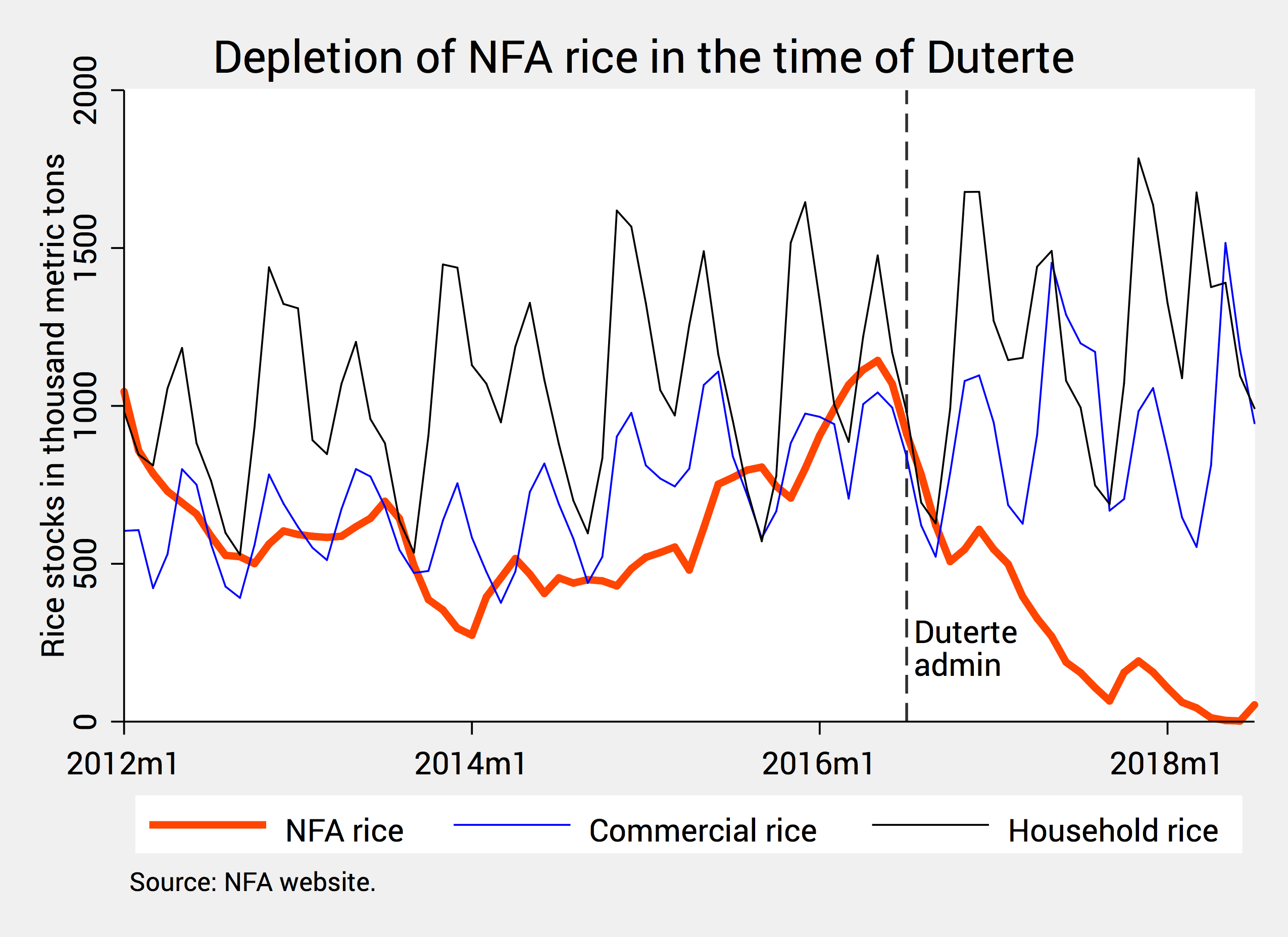SUMMARY
This is AI generated summarization, which may have errors. For context, always refer to the full article.
![[ANALYSIS] Filipinos don’t deserve fumigated nor weevil-infested rice](https://www.rappler.com/tachyon/r3-assets/682C527C63844C5B809167A66C234F6E/img/A705421B4DDC4370A7D8050667AE24B1/Filipinos-dont-deserve-fumigated-nor-weevil-infested-rice-Aug-28-2018.jpg)

(UPDATED) Rice policy has always been a source of frustration among economists. But this time around, things seem to be crazier than usual.
By all accounts, the country seems to be on the cusp of a rice crisis.
Figure 1 shows that commercial rice prices have skyrocketed in recent months. Rice prices similarly surged back in 2014, but we’ve now exceeded those levels.

Figure 1.
Aside from hurting the poor most of all, higher rice prices are also felt more acutely in some regions than in others.
Officials in Zamboanga City, where rice prices already reached P70 per kilo, have already declared a state of calamity. Retailers there are even coaxing patrons to consider corn as a viable substitute.
Aside from higher prices, government is also desperately forcing upon us low-quality rice. Some officials even had the temerity to suggest that Filipinos eat fumigated or weevil-infested rice, which they claim is safe to eat.
Why this burgeoning rice crisis? In this piece, I argue that government is wholly to blame.
Just as Filipinos don’t deserve fumigated nor weevil-infested rice, so Filipinos don’t deserve to suffer the chronic ineptitude and insensitivity of rice policymakers. The National Food Authority (NFA) has one crucial job – to stabilize rice prices nationwide – but it seems to have failed miserably.
Indeed, it’s becoming increasingly obvious that leaving rice largely in the hands of government bureaucrats is a patently bad idea. It’s high time we changed that.
Depleted stocks
Our rice problems started with the near-depletion of NFA rice stocks since President Duterte came into office.
Figure 2 shows that in June 2016 – right before Duterte assumed office – we had over a million metric tons of NFA rice in stock. By June 2018, we were down to an appalling 2,000 metric tons.

Figure 2.
In a previous piece, I said that a mix of ineptitude and corruption contributed to this dwindling of NFA rice stocks.
This includes flooding the markets during the harvest season, and the NFA Administrator Jason Aquino’s dubious diversion of rice stocks to certain rice traders. (READ: The alarming depletion of NFA rice under Duterte’s watch)
Mismanagement of the NFA even led to infighting between Duterte’s friends in government. At one point Duterte even removed Cabinet Secretary Jun Evasco and the NFA Council’s oversight over rice imports, leaving the task to the NFA alone.
This worried many because the NFA Council was set up precisely to minimize politics and corruption in rice importation, which is largely the government’s prerogative.
Yet, as far as the NFA administrator is concerned, Duterte’s hands seem tied because of Jason Aquino’s direct links to Special Assistant to the President Bong Go.
Belated imports
Alas, we’re now paying for Duterte’s decision to leave rice importation largely with the NFA, sans the scrutiny of the NFA Council.
Government moved to replenish NFA rice stocks by importing from Vietnam and Thailand 250,000 metric tons of rice, which they already did through G2G (government-to-government) arrangements.
Despite the arrival of imports, however, rice prices continue to surge. Various government officials blamed “heavy rains” for the stalled disembarkation of rice from the cargo ships.
This excuse is wholly unsatisfactory because the imported rice started arriving June 5. It’s been almost two months, yet why are such supplies still not completely distributed, and hence denting prices?
Indeed, the delays were so long some 330,000 sacks already got infested with bukbok or weevils.
In response, the NFA wants to fumigate such rice, claiming it’s still “safe for human consumption, especially if it is washed before cooking.”
Agriculture Secretary Manny Piñol even dared people to serve him the weevil-infested rice, which he will readily eat to show the world it’s safe. Piñol even argued that weevils signaled the rice stocks were not sprayed with potentially harmful insecticides.
No matter how safe they are, Filipinos don’t have to eat fumigated or weevil-infested rice if only government had done a better job importing rice quickly and efficiently.
Nonsensical statements
Aside from the belated importation of rice – for which NFA officials and NFA Council members are now blaming each other – rice policymakers are also spewing policy statements that defy economic sense.
For example, Secretary Piñol justified higher rice prices by saying it’s a win for farmers. “Farmers never had it so good,” he said.
But this claim ignores the fact that traders and other middle-men also benefit immensely from higher prices, almost always at the expense of consumers.
Studies also show that Filipino farmers are “net consumers” rather than “net sellers” of rice – meaning they consume more rice than they sell, so higher rice prices actually hurt them more in the end.
Secretary Piñol also said he would rather legalize all rice-related transactions – including smuggling – if only to abate rice shortages, especially in Zamboanga City and nearby provinces.
But this brings us back to some economists’ plea to abolish the NFA altogether.
For them, rice smuggling is nothing but a manifestation of unmet demand for rice. In turn, this recurring shortage stems from NFA’s virtual monopoly in rice imports, for which it is often guilty of over- or under-importation.
By abolishing the NFA – or at least minimizing its influence and allowing more imports by the private sector – economists say we can expect to see more stable rice stocks and prices.
It will also prevent the absurd scenario of government having to call for the legalization of smuggling.
Finally, talks of imposing a price ceiling on rice have surfaced again.
Although politically attractive, this idea is patently unsound. It’s like trying to put out a fire by dousing it with alcohol.
By preventing rice supply to meet rice demand, a price ceiling is a surefire way to worsen rice shortages nationwide. It also betrays the proponents’ disturbing lack of understanding of basic economic principles.
Excessive intervention
Amid the Duterte administration’s blundering rice policies, calls for the abolition of the NFA are growing stronger.
Far from ensuring stable rice supplies and prices, the NFA only allowed stocks to dwindle and prices to skyrocket. The NFA is also financially burdensome because its business model is unprofitable by design: to buy rice at high prices and sell it at low prices.
In addition, the NFA has been constantly marred by corruption and mismanagement.
The Commission on Audit, for example, recently called out NFA management for diverting P5.1 billion of its funds in 2017 to pay for its loans rather than implement its food security programs.
There are also reports that some of Duterte’s friends in government benefited from the recent mass importation of rice via forward contracts they secured early on.
Thankfully, Congress is now paving the way for less government intervention in rice – and greater private sector participation – with the proposed rice tariffication bill, which the House already approved on 3rd reading.
To be sure, this measure falls short of fully liberalizing the rice sector, and lawmakers are unsure how much it will help to temper the recent acceleration of prices.
But at this point, I guess we can all agree that there’s too much government in the rice sector, and it’s high time we changed that.
Duterte’s rice policymakers will do well to open their minds to suggestions, no matter how radical. Otherwise, they will forever be remembered as the government that once pushed fumigated and weevil-infested rice onto the Filipino people. – Rappler.com
The author is a PhD candidate at the UP School of Economics. His views are independent of the views of his affiliations. Follow JC on Twitter: @jcpunongbayan.
Add a comment
How does this make you feel?
There are no comments yet. Add your comment to start the conversation.